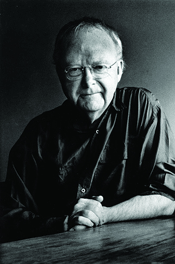At the BBC Proms in the Royal Albert Hall, it was wonderful to see the brass sections, carefully positioned at each side of the orchestra, catch the light, magnifying the blaze of sound. De Staat is so radical that it still sounds fresh after almost 40 years. Essentially, it’s a wild, almost savage piece that breaks all the rules of form and development that constitute formal music. But such manic, kinetic energy! Driving, compelling rhythmic patterns drive the piece forward. The patterns are circular, revolving on themselves relentlessly without beginning or end. Structurally, blocks of density are intersected by planes of sharp brightness.
De Staat is theatre, designed to be experienced live as its visual impact is very much part of the action. Thus two brass sections are positioned on each side of the orchestra, trombones and trumpets catching the light, so they shine in an ever more dazzling blaze. The harp is placed prominently, for it represents the plucked strings mentioned in the text.
De Staat is also interesting because it transcends text. It’s based on Plato’s The Republic where music is denounced as a form of subversion. The words matter. At early performances, audiences were given the text to read carefully before the beginning. so they’d retain the ideas rather than read them during performance. For De Staat transcends text. The singing is deliberately embedded into the music, almost abstract, like a cryptic code whose meaning goes deeper than surface words. Modern music doesn’t do simple word-painting. Meaning is absorbed, translated into abstract sound.
The texts are in ancient Greek, which most people don’t understand nowadays, which is all the more reason to focus on how the music itself expresses meaning, not just the words. The final chorus is illuminating for it quotes authoritarian dogma dictating what instruments and tonal modes may be used and which forbidden. “Musical change always invokes far-reaching danger. Any alteration in the modes of music is always followed by alteration in the most fundamental laws of the State”.
So Andriessen’s unremitting, hard planes of sound express extreme tension.This Proms performance, conducted by Lucas Vis, leading the Netherlands Wind Ensemble, celebrated the composer’s birthday, so wasn’t quite as distressful as some performances, where the relentless, pounding rhythms create severe anxiety. This is an ensemble for whom the work is basic repertoire - listen to the live recording, also by the Netherlands Wind Ensemble, from the 1978 Holland Festival, included as a CD in the book by* Robert Adlington, Louis Andriessen : De Staat* (Ashgate 2004).
This sense of fear and danger is important, for the driving repetitions represent the idea of enforced conformity. Hence the need for tight, disciplined performance. The very structure of De Staat is meaning. As Andriessen has said, “there is no hierarchy in the parts”. The chorus is only one of the several units in the piece that function in parallel, rather like society itself. . Voices may be suppressed in authoritarian states, but abstract music can still speak. This pertains to much of Andriessen’s work for music theatre and opera, where the action “is” in the music rather than the concept of opera as narrative singing with music..
Andriessen has written several operas, some of which are well known, such a Writing for Vermeer. He’s collaborated fruitfully with Peter Greenaway for several years, reflecting their common interests in music and film. in 2008, Andriessen’s “film opera” La Commedia was featured at the Holland Festival. An excerpt from the opera, The City of Dis, was premeired at the Walt Disney Hall in Los Angeles, conducted by Esa-Pekka Salonen.
This Prom program was extremely well chosen, placing De Staat between Steve Martland’s Beat the Retreat and Cornelis de Bondt’s Closed Doors. Martland’s piece mixes early English music with progressive rock. It’s a cheerful act of irreverent anarchy, written in protest against new government laws on outdoors entertainment. De Bondt’s piece, from 1985, starts and ends with a deep sonic boom that reverberated nicely in the Royal Albert Hall. It’s part of a much larger work that pivots different threads of music history upon each other. That’s why there were two conductors, not in itself any big deal (Charles Ives did it decades ago). Like De Staat, the material circulates, disparate parts that can’t meld although as a whole they make a statement.
The Proms are broadcast every day on BBC Radio 3 and are available online, on demand for seven days after the performance. See www/bbc.co.uk/proms
Anne Ozorio
